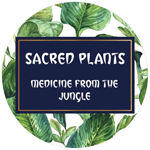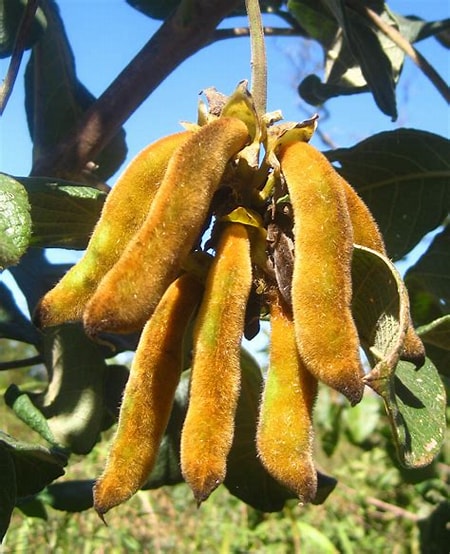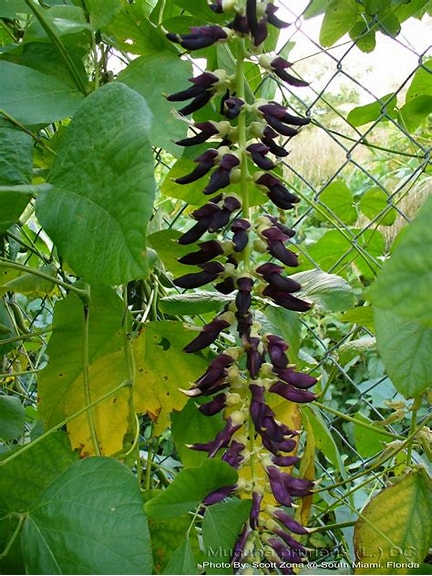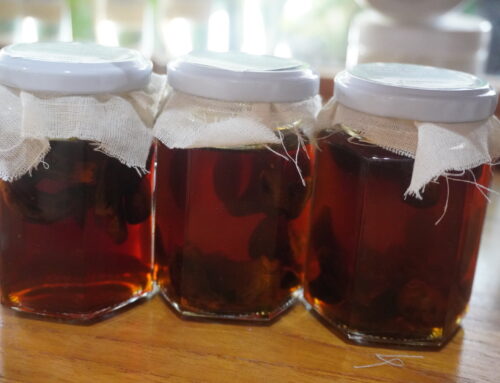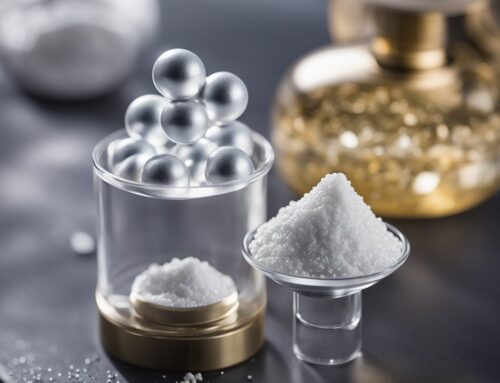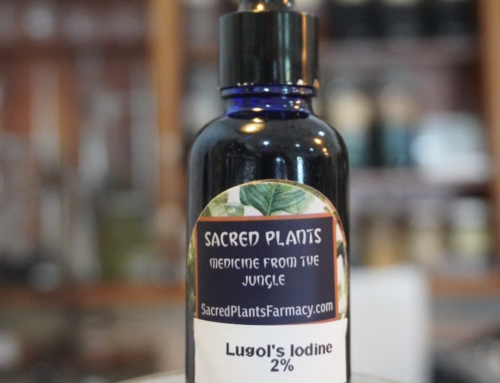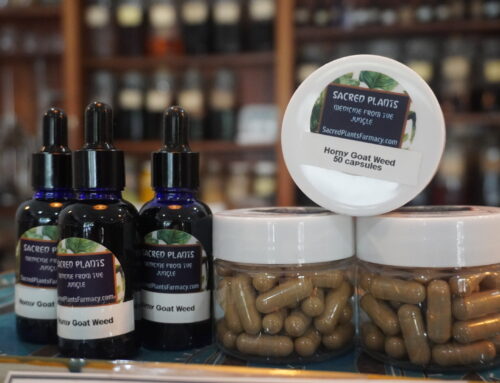Called the secret of eternal youth!
Mucuna Pruriens is considered very important in traditional medicine in the indigenous culture of the Bribri here in Costa Rica due to its high content of dopamine. It is used as an aphrodisiac, tonic, for UTIs, neurological or menstrual disorders and many other diseases like Parkinson’s.
- Natural source of L-dopamine
- Boosts dopamine in the brain
- Protects the brain and reduces stress
- Improves sleep
- Improves mood
- boosts fertility in men (5 capsules a day)
- mild aphrodisiac
Dose is 2-5 capsules a day. Parkinson’s patients are often recommended to take up to 8 capsule per day. Please read the risks and side effects in the Read more About section below.
The seeds of the Mucuna pruriens plant are known to naturally contain levodopa, also known as L-dopa, at high concentrations of four to seven percent. It also contains hallucinogenic tryptamines, phenols and tannins. Its substantial L-dopa content is the main reason why it’s used in the treatment of Parkinson’s disease.
1. Parkinson’s Disease
How does Mucuna pruriens work and how may it be helpful as a natural treatment for Parkinson’s disease? Mucuna pruriens contains high levels of naturally occurring L-dopa, which is the precursor to dopamine. Dopamine is a key neurotransmitter in the brain that is necessary for not only coordinating proper body movements, but also things like learning, increasing motivation and regulating moods.
When someone has Parkinson’s disease, nerve cells that produce dopamine in the brain slowly break down or die. So people with the disease have lowered levels of dopamine, which causes the abnormal brain activity that leads to Parkinson’s symptoms. (3)
Western medicine uses a synthetic form of L-dopa to boost dopamine levels in Parkinson’s patients while Ayurvedic medicine is known to use Mucuna pruriens to treat Parkinson’s by increasing dopamine levels.
Three open label studies looked at the effects of mean dosages of 45 grams per day of Mucuna seed powder extract (which contains about 1500 milligrams of L-dopa) on between 18 and 60 patients demonstrated “significant improvements” in Parkinson’s symptoms for 12 to 20 weeks. One of the studies even suggested that patients the Mucuna extract may be more tolerable than standard L-dopa preparations. (4)
2. Male Infertility and Sexual Function
Is Mucuna pruriens testosterone boosting and helpful for male infertility? While it’s unclear if it will boost testosterone in fertile men, it does appear to boost levels for males struggling with infertility. Research conducted at the C.S.M. Medical University in India investigated the effects of Mucuna pruriens on 75 men undergoing infertility screening compared to a control group of 75 healthy fertile men.
The study reveals that treatment with velvet bean significantly improved testosterone, luteinizing hormone, dopamine, adrenaline and noradrenaline levels in infertile men. In addition, sperm count, and sperm motility were “significantly recovered” in the infertile men after treatment. (5)
Sexual dysfunction and low libido can often be a problem for men who have diabetes. A study published in 2012 looked at the effects of M. pruriens on male sexual behavior and sperm parameters in long-term hyperglycemic male rats. The researchers found that animal subjects with diabetes who were given M. pruriens seed extract “showed significant improvement in sexual behavior, libido and potency, sperm parameters, DSP, and hormonal levels” when compared to the diabetic-induced subjects not given any of the extract. (6)
3. Mood Lifter & Natural Antidepressant?
Having a dopamine deficiency has been implicated in some cases of depression. (7) Is Mucuna pruriens depression relief a thing? A research study published in 2014 in AYU (an International Quarterly Journal of Research in Ayurveda) took a look at the antidepressant effects of velvet bean seeds using various experimental models of depression using animal subjects. Overall, the study concludes that hydroalcoholic extract of the seeds (at doses of 100 mg/kg and 200 mg/kg) exhibit antidepressant effects, which the researchers believe may likely have to do with velvet bean’s known ability to increase dopamine levels. (8)
Another research study published in 2013 in the journal Oriental Pharmacy and Experimental Medicine also evaluated the antidepressant action of Mucuna pruriens seeds and found that Mucuna pruriens doesn’t only affect dopamine. The animal subjects administered the Mucuna pruriens seed extract for two weeks also exhibited increases in two more key neurotransmitters that affect mood: serotonin and norepinephrine. (9)
This is significant research finding since clinical evidence has shown that people with depression typically have disturbances in serotonin, norepinephrine and dopamine (DA) neurotransmission in the central nervous system. (10)
4. Stress Reducer
A study published in the Journal of Evidence-Based Complementary & Alternative Medicine found that not only does velvet bean improve semen quality in infertile men, but it also appears to reduce stress, which can contribute to infertility.
This 2010 study looked at 60 subjects undergoing infertility screening who were also suffering from psychological stress and elevated cortisol levels. The male subjects took five grams of M. pruriens seed powder by mouth daily for three months. The study results demonstrate that velvet bean can help to reactivate the antioxidant defense system of infertile men and improve sperm quality while also improving stress management. (11)
5. Ayurvedic Aphrodisiac
Mucuna pruriens has been used as a traditional Ayurvedic Indian medicine since the ancient Vedic times (1500–1000 BC). In Ayurveda, Mucuna pruriens is commonly used as a strong yet natural aphrodisiac. In addition, it’s used to treat nervous disorders and arthritis.
Risks and Side Effects
Possible Mucuna pruriens side effects may include headache, pounding heartbeat, and symptoms of psychosis such as agitation, confusion, hallucinations and delusions.
A powdered preparation of velvet bean seed, called HP-200, is possibly safe for most people when taken by mouth for up to 20 weeks. The most common side effects of this preparation include nausea and a sensation of abdominal bloating while less common side effects may include vomiting, abnormal body movements and insomnia.
The hair of the Mucuna pruriens bean pod is generally considered unsafe and should not be taken orally or used topically since it is a strong irritant which can cause severe burning, itching and swelling.
There is currently a lack of information about the safety of taking velvet bean while pregnant or breastfeeding, so it’s best to be on the safe side and not use it.
Speak with your doctor before taking Mucuna pruriens, especially if you have any ongoing health concerns or are currently taking medications.
Mucuna pruriens is typically not recommended for people with any of the following:
- Cardiovascular disease
- Diabetes
- Hypoglycemia
- Liver disease
- Melanoma
- Mental illness
- Peptic ulcer disease
Since velvet bean may lower blood sugar levels, you should stop taking velvet bean at least two weeks before any surgery.
In terms of possible medication interactions, the following should never be taken in combination with Mucuna pruriens: (16)
- Methyldopa (Aldomet)
- Medications for depression (MAOIs) such as (Nardil) and tranylcypromine (Parnate), for example.
Other drugs known to moderately interact with Mucuna pruriens include Guanethidine (Ismelin), anesthesia, antidiabetes drugs, antipsychotic drugs and tricyclic antidepressants.
The statements made within this website have not been evaluated by the Food and Drug Administration. These statements and the products of this company are not intended to diagnose, treat, cure or prevent any disease.
